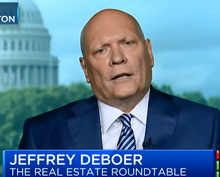Rep. Bill Shuster (R-PA), the outgoing chairman of the House Transportation and Infrastructure Committee, released "discussion draft" language on July 23 aimed at improving and sustainably financing U.S. transportation and other infrastructure systems. (Section-by-Section analysis of the proposal)
 |
Roundtable President and CEO Jeffrey D. DeBoer appeared last summer on CNBC’s Squawk Box, emphasizing the importance of P3s as a platform to finance the design, building, operation and long-term maintenance of projects across all infrastructure asset classes(CNBC, June 7, 2017). |
- Shuster, who is retiring after the upcoming midterm elections, provided a "vision statement" explaining that the draft "is intended to further the national conversation about the current state of America's infrastructure and highlight some of the major roadblocks to funding and improving our transportation network." He stated his proposal reflects "input from Members of Congress from both sides of the aisle" in an effort to build bipartisan support.
- The wide-ranging draft proposes to phase-in increases to the "pay at the pump" gas tax and then eliminate it after 10 years; pilot a per-mile travelled "user fee"; shore-up the federal loan and guarantee program for mass transit; establish a public-private partnership (P3) program to construct and rehabilitate federal buildings; and establish a one-stop federal permitting shop to expedite project approvals. (Eno Transportation Weekly, July 23)
- Any broad infrastructure policy conversation would likely address federal-state cost sharing arrangements for mass transit projects - such as the Gateway program to improve bridge and tunnel crossings between New York and New Jersey. For example, a June 29 letter from Trump Administration transit officials indicated a change in agency policy - that loans by the U.S. Transportation Department, repaid by state and local governments, should factor into grant decisions. The effect would be to reduce the amount of federal grants for mass transit and increase the state/local share. (B-Gov, July 3)
- Anticipating infrastructure as an issue for possible compromise after the upcoming elections, The Roundtable has offered a number of comments to the Administration and Congressional committees on real estate's role in creating public-private partnerships to help repair roads, transit, broadband, power grid and other systems that are needed to make communities safe, productive and competitive. (Roundtable Weekly, January 26)
Roundtable President and CEO Jeffrey D. DeBoer appeared last summer on CNBC's Squawk Box, emphasizing the importance of P3s as a platform to finance the design, building, operation and long-term maintenance of projects across all infrastructure asset classes. Policies starting with streamlined permitting and a range of financing platforms should all be considered by lawmakers as layers in the "capital stack" for infrastructure," DeBoer told Squawk Box. (CNBC, June 7, 2017)
